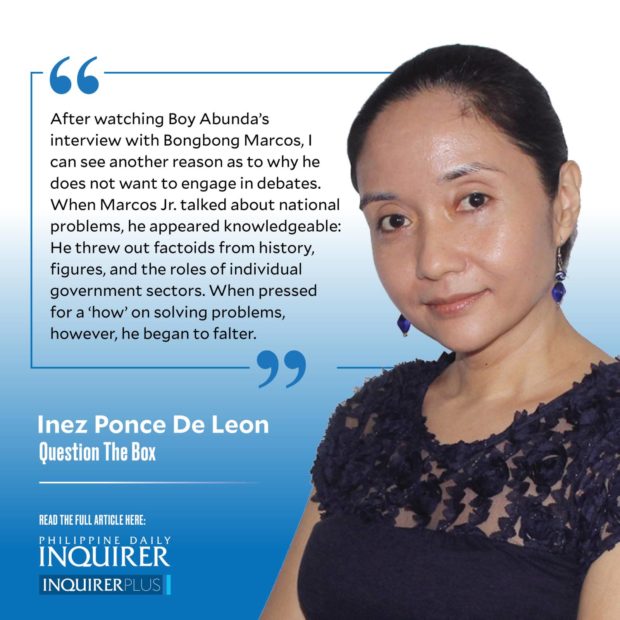
To discuss how this insight came about, allow me to write as a former debater. I am a proud alumna of St. Scholastica’s College Manila, and many of my happy memories come from our high school debate classes.
Debate taught us to synthesize the knowledge we had been given, evaluate it, and use it to assemble a clear argument. We had to do research on both sides of any issue, using credible sources, and avoiding fallacious arguments that targeted anything but the issue at hand. We could not insult another debater or proclaim empty sentences. We had to speak with both empathy and logic, within a strict time limit.
Debate also forced us to listen closely to arguments, anticipate what our opponents would say, and assess their response within seconds. We had to come up with rebuttals while unpacking another team’s reasoning, all while being consistent with the logic of our stance. In the end, we walked away with skills that we would use our entire lives: critical thinking, a love for questioning, an interest in issues.
We also walked away with the ability to recognize empty plans disguised as empathy.
Debating involves closely examining the assumptions that lead to specific views about an issue, recognizing that all issues are thorny and complicated, and acknowledging that any “fact” always arises from a specific context.
Debating entails anticipating counterattacks by having all the information on hand, which means that any good debater should think in terms of systems rather than individual ideas.
For instance, it is easy to say: we should provide more jobs for our citizens. The questions inevitably follow: How? Do we open more companies? Which sectors will we prioritize, and why? What kinds of jobs do we need? How many people need jobs, and what kind of training will they require? What facilities and infrastructure will we need to accommodate this new workforce? How can we make job creation sustainable? What does the scholarly research say?
There are still many thorns in this prickly issue. Nevertheless, this example shows that debate demands an ability to think through complex situations by acknowledging the networks of sectors involved in the matter, and, therefore, the different experts who can solve the problem.
After watching Boy Abunda’s interview with Bongbong Marcos, I can see another reason as to why he does not want to engage in debates.
When Marcos Jr. talked about national problems, he appeared knowledgeable: He threw out factoids from history, figures, and the roles of individual government sectors. He also seemed to have empathy because he spoke about the personal aspects of national issues; he referenced the struggles of the marginalized, talked about his own experiences as a father.
When pressed for a “how” on solving problems, however, he began to falter.
He threw out catchy phrases, like jabs and jobs. However, he could not provide a process to create these jobs, nor talk about programs he had worked on to demonstrate his experience in executing solutions. His proposals appeared like disaggregated tasks on a to-do list rather than components of a well-prepared, tested plan. The nature of his answers was consistent: He could see the different players in the complex world of governance, but he could not see how they were all connected and could be conflicting.
In enumerating his so-called solutions, moreover, he showed that his empathy is built on knowing the information, rather than on being hands-on—which would have oriented him on the real complexity of the task at hand.
Marcos Jr. refuses to engage in debate because he fears the demands of creating a true counterattack. He needs to have pertinent, credible information on hand—an impossible task for one who cannot critique his own beliefs, who can only enumerate facts but not synthesize them, who cannot think in terms of systems.
He is also afraid of what the debate represents. In speaking up, he must demonstrate the task of the chief executive: the one who ties the many parts of government together into a cohesive, progressive whole.
What kind of “unity” platform does he have in mind when he cannot even imagine how to harmonize the many jobs of the government he has the audacity to think of running?
—————–
iponcedeleon@ateneo.edu